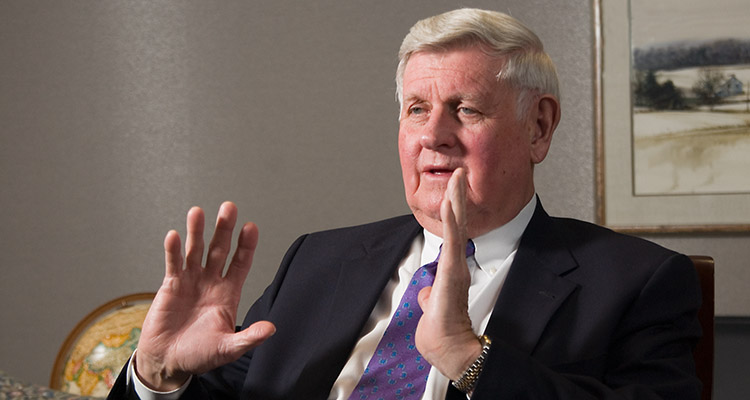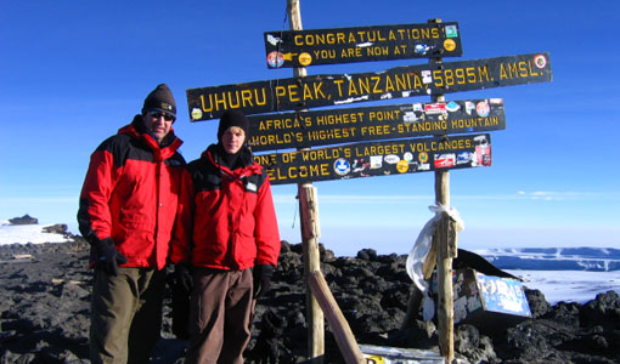Al McQuinn never really left the farm field.
He has lived most of his adult life in Edina and now splits his time between there and Florida, where he shares an office with fellow St. Thomas trustee Gerry Rauenhorst. McQuinn's businesses always have had their headquarters in the Twin Cities, and his office today is in an Edina building off a congested highway.
But his heart and his soul are still among the crops. As he reminisces about his life's work, you can see him out in the field - looking at crops, listening to farmers about yields, making a pitch to fertilizer dealers about new application equipment and technology. The soil isn't under his fingers and the sweat from a noon sun isn't on his brow, but he still speaks with intelligence, wisdom and passion about farming.
And he should. Farming not only defined McQuinn, but McQuinn helped to define farming as we know it today and will recognize it for generations to come.
McQuinn founded Ag-Chem Equipment Inc. in 1963 and ran it for 37 years before selling it, but he did more than just "run" the company. He grew it into a world-renowned, NASDAQ-listed manufacturer of equipment that applies fertilizers and farm chemicals, with more than $300 million in annual revenues and 1,700 employees. In the process, he earned a reputation as a "precision agriculture" pioneer motivated by one goal: getting the best yield of crops from an acre of soil.
"I just always enjoyed that challenge," he said. "I just wanted to help fertilizer dealers and farmers, and this seemed to be a good way to advance agriculture."
McQuinn was born on a farm near Butler, Mo., during the Depression, and his family "raised a little of everything," he said. They moved to Independence, Mo., at the beginning of World War II so his mother could work at an ordnance plant. McQuinn spent weekends, holidays and summers working on a cousin's farm outside the city limits.
Back in town, he often would bump into Harry S. Truman strolling through the neighborhood. "I'd walk to school up Pleasant Avenue," McQuinn said, "and sometimes he'd be walking by himself. I'd always say, 'Good morning, Mr. Truman,' and he'd say, 'Good morning, young man.' He was just an incredible person - totally self-educated in history, literature, languages and the arts, with a high set of values and standards."
McQuinn enrolled at the University of Missouri-Columbia because he thought a college education would help him improve his future in agriculture. He earned a bachelor's degree in agriculture in 1954 and, as an Army ROTC graduate, spent most of four years as a pilot stationed at Fort Bliss near El Paso, Texas.
"When I was in the Army, I flew to Minnesota in June of '58 and got a look at the beautiful crops of southern Minnesota," he said. "It looked like the Garden of Eden compared to Missouri. I thought, 'I would like to live here someday.' When I got back to El Paso, I told my wife Mary Agnes that Minnesota would be great place to live, and she agreed."
McQuinn's first job was selling fertilizer to dealers, and he quickly learned the importance of proper nutrient balance in soils. That spurred an interest in better equipment and more efficient ways of applying fertilizers and farm chemicals.
With $6,000 in the bank, he founded Ag-Chem. He purchased sprayers and other equipment and leased them to fertilizer dealers and other individuals. He also looked for ways to grow his company. He foresaw a need for attachments that would broaden the use of application equipment, "but manufacturers wouldn't build them for me, so I opened a shop (in 1967) and built them myself."
In this "shop" in Jackson, just north of the Iowa border in southwestern Minnesota, Ag-Chem did more than just build attachments. The company designed and manufactured two new lines of self-propelled application equipment known as Terra-Gators and RoGators, and over the next four decades Ag-Chem grew into the industry leader and Jackson's largest employer (with five buildings and more than 1,000 employees).
Not content with just delivering more efficient equipment, McQuinn also wanted to harness increasingly sophisticated technology to help farmers improve crop yields. By spending more than $25 million on software and hardware development during a five-year period in the 1990s, he led the effort to create a system that integrated GPS technology, GIS software, on-board computer controllers, variable rate application equipment and yield monitor data, thus giving rise to "precision agriculture."
"By merging soil sample data with yield monitor information, we would create a map that showed the level of nutrients needed for each part of a field based on what was already present in the soil, what was harvested last year, and what was being grown this year," he said. "We would load this map on a computer in a Terra-Gator equipped with variable rate bins and a GPS receiver. As the machine moved across the field, it applied the optimum mix of fertilizer and farm chemicals for each location."
The system was a revolutionary change from the longtime "one size fits all" practice of applying fertilizer and chemicals. That approach "is not the best agronomically or environmentally, nor is it the most cost-effective," he said. "Our crop input system enables you to manage a big old sandy spot in the middle of field differently than the deep, loamy soil that surrounds it."
McQuinn received seven patents for his work and Ag-Chem became "the epicenter of ground-rig customer application," according to a 1998 story in Dealer Progress magazine.
"This is a guy who doesn't have a computer on his desk, but he understood the impact of technology on business and what it could do for farmers," said his daughter, Mary Jettland, who worked at Ag-Chem for 20 years and was senior vice president for soil technology. "He was out to change agriculture, and putting technology in place allowed him to do so."
McQuinn also succeeded because he put the customer first, said Dave Lovell, who joined Ag-Chem in 1984. "Keep the customer satisfied and you'll get the return you want and the profit you need. The customer may not have been always right, but Al's philosophy was to resolve issues and move on."
As with any business, the founder eventually moves on himself, and in 2000 McQuinn decided to sell Ag-Chem to Georgia-based AGCO Corp., the world's third-largest farm equipment manufacturer. "I was ready to sell," he said. "I felt we had developed our products to a high level of performance and reliability."
Some people worried AGCO might reduce operations in Jackson because the new owner had plants elsewhere, but that has not been the case. AGCO has moved other product lines, including Challenger tractors, to Jackson, Lovell said.
While McQuinn sold the company, he did not retire. The Minnesota Business Hall of Fame member runs QuinStar Investment Partners and is n active options trader. He also keeps an eye on what's going on in his old line of work, encouraging industry competitors to work together more to create compatible crop data management systems that would boost their bottom lines and - most importantly - would benefit farmers.
And that is what it's all about for Al McQuinn, whose heart and soul never have left the fields.
Al McQuinn and St. Thomas
· Joined the board of trustees in 2005 and serves on the Investment Committee. In 1997, received the Cade Award for outstanding achievements as an entrepreneur.
· Has a son, Charles, who is a 1993 alumnus, and three grandchildren are students - Andrew Arndt '02 is a third-year School of Law student, his brother Edward is a senior, and their cousin Katherine Jettland is a senior and all-MIAC hockey goalie.
· With his wife, has funded the Alvin and Mary Agnes McQuinn Distinguished Chair in Arts and Sciences; the chair's first holder, Dr. Marisa Kelly, was invested in October and is dean of the College of Arts and Sciences. The McQuinns also have supported new McNeely Hall, where McQuinn Commons is named after them, and a School of Law scholarship established in the name of the late James Larkin '51.
· Believes St. Thomas has two primary challenges: to keep its education attainable and affordable, and to better communicate the value of a campus-based education. While he understands the growing popularity of online learning, especially among graduate students, he says that "real learning takes place through the give-and-take interaction between students and faculty in the classroom.







